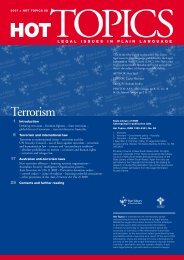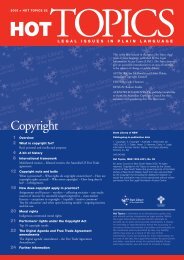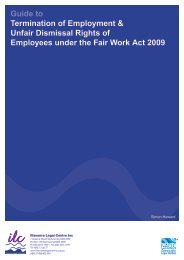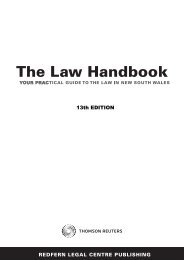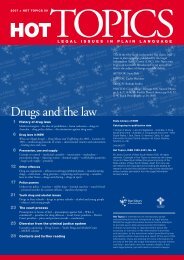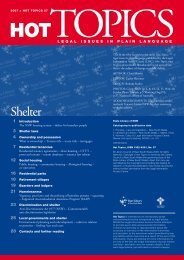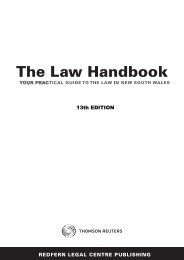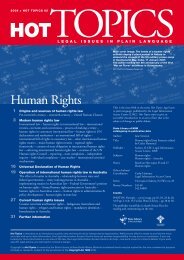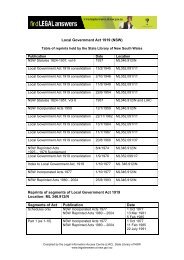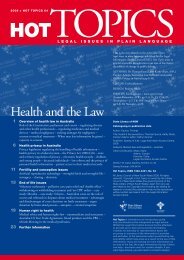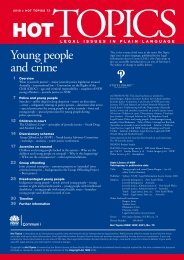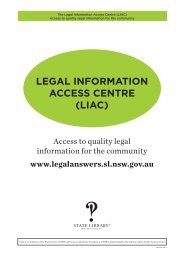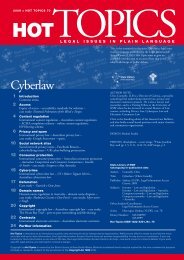Aboriginal people and the law - Legal Information Access Centre
Aboriginal people and the law - Legal Information Access Centre
Aboriginal people and the law - Legal Information Access Centre
Create successful ePaper yourself
Turn your PDF publications into a flip-book with our unique Google optimized e-Paper software.
2 <strong>Aboriginal</strong> <strong>people</strong> <strong>and</strong> <strong>the</strong> <strong>law</strong> 45[2.90] Customary <strong>law</strong> <strong>and</strong>criminal <strong>law</strong>In Walker v New South Wales (1994) 182 CLR45, <strong>the</strong> High Court considered whe<strong>the</strong>rcustomary <strong>law</strong> has application in criminal<strong>law</strong> where <strong>the</strong>re is no legislative basis.Chief Justice Mason concluded that <strong>the</strong>criminal <strong>law</strong> was intended to apply to <strong>the</strong>whole community <strong>and</strong> <strong>the</strong>refore any customary<strong>law</strong> would necessarily be inconsistentwith <strong>the</strong> common <strong>law</strong>, <strong>and</strong> consequentlyextinguished.Defending traditional fishing rightsBen Ali Nona, a traditional owner of <strong>the</strong>l<strong>and</strong> <strong>and</strong> waters of <strong>and</strong> around MurrayIsl<strong>and</strong> in <strong>the</strong> Torres Straits, was acquitted in<strong>the</strong> Queensl<strong>and</strong> District Court of a charge ofarmed robbery after he took <strong>the</strong> catch from acommercial fishing boat while armed. Nonasuccessfully argued that he had an honestclaim of right – that is, he had an honestlyheld belief as to his or his <strong>people</strong>’s legalentitlement to <strong>the</strong> fish (see also R v Fuge[2001] NSWCCA 208). In Yanner v Eaton(1999) 201 CLR 351 traditional <strong>law</strong> was adefence to <strong>the</strong> State’s prosecution of Murr<strong>and</strong>ooYanner for hunting juvenilecrocodiles. Two recent High Court cases ontraditional fishing rights, Akiba v Commonwealth[2013] HCA 33, (2013) 250 CLR 209<strong>and</strong> Karpany v Dietman [2013] HCA 47confirm that <strong>Aboriginal</strong> <strong>and</strong> Torres StraitIsl<strong>and</strong>er traditional fishing rights are recognised<strong>and</strong> protected by <strong>the</strong> Native Title Act,<strong>and</strong> although State <strong>and</strong> Commonwealthfishing <strong>law</strong>s might regulate those rights,s 211 of <strong>the</strong> Native Title Act protects <strong>the</strong>irexercise. The decisions also establish that aright to take marine resources under traditional<strong>law</strong> is not necessarily limited totaking for a particular purpose, such asdomestic use, <strong>and</strong> that where traditional <strong>law</strong>supports fishing for non-domestic purposes,traditional owners may exercise rights forcommercial <strong>and</strong> domestic purposes.[2.100] Finding a way ofreconciliationSuch issues are difficult. In <strong>the</strong> past, whereconflict arose between <strong>Aboriginal</strong> <strong>law</strong> <strong>and</strong>custom <strong>and</strong> Australian <strong>law</strong>, Australian <strong>law</strong>prevailed. This is still <strong>the</strong> case, but whensuch issues are raised in <strong>the</strong> press or <strong>the</strong>courts, <strong>the</strong>re is now a sense that manyAustralians have an underst<strong>and</strong>ing that<strong>the</strong>re must be a place for <strong>Aboriginal</strong> <strong>law</strong> <strong>and</strong>custom within <strong>the</strong> Australian legal system.In NSW, even with a developingawareness, <strong>Aboriginal</strong> <strong>law</strong> <strong>and</strong> custom remainsat <strong>the</strong> fringe.[2.110] The Nor<strong>the</strong>rn TerritoryInterventionOn 15 June 2007 a report entitled LittleChildren are Sacred was released by <strong>the</strong>Nor<strong>the</strong>rn Territory government. It identified<strong>the</strong> extent of child sexual abuse claims inNor<strong>the</strong>rn Territory <strong>Aboriginal</strong> communities<strong>and</strong> made 101 recommendations to <strong>the</strong>Nor<strong>the</strong>rn Territory government regarding<strong>the</strong> needs of those communities.In response to <strong>the</strong> report, <strong>the</strong> federalgovernment passed <strong>the</strong> Nor<strong>the</strong>rn TerritoryNational Emergency Response Act 2007 (Cth)(NTER). In order to pass <strong>the</strong> legislation itwas necessary to suspend <strong>the</strong> operation of<strong>the</strong> Racial Discrimination Act 1975 (Cth) as<strong>the</strong> legislation was clearly discriminatory.The NTER provided for <strong>the</strong> acquisition of<strong>Aboriginal</strong> l<strong>and</strong> by compulsory lease, incomequarantining (issuing food vouchersra<strong>the</strong>r than welfare payments, removingaccess to welfare payments) <strong>and</strong> variouso<strong>the</strong>r measures. A review of <strong>the</strong> legislationwas undertaken by a task force appointedby <strong>the</strong> federal government, following which<strong>the</strong> Rudd government determined to continuewith <strong>the</strong> emergency measures.In his February 2010 report “ObservationsOn The Nor<strong>the</strong>rn Territory Emergency ResponseIn Australia”, United Nations SpecialRapporteur on <strong>the</strong> situation of human rights<strong>and</strong> fundamental freedoms of Indigenous<strong>people</strong>, James Anaya found that, “as cur



